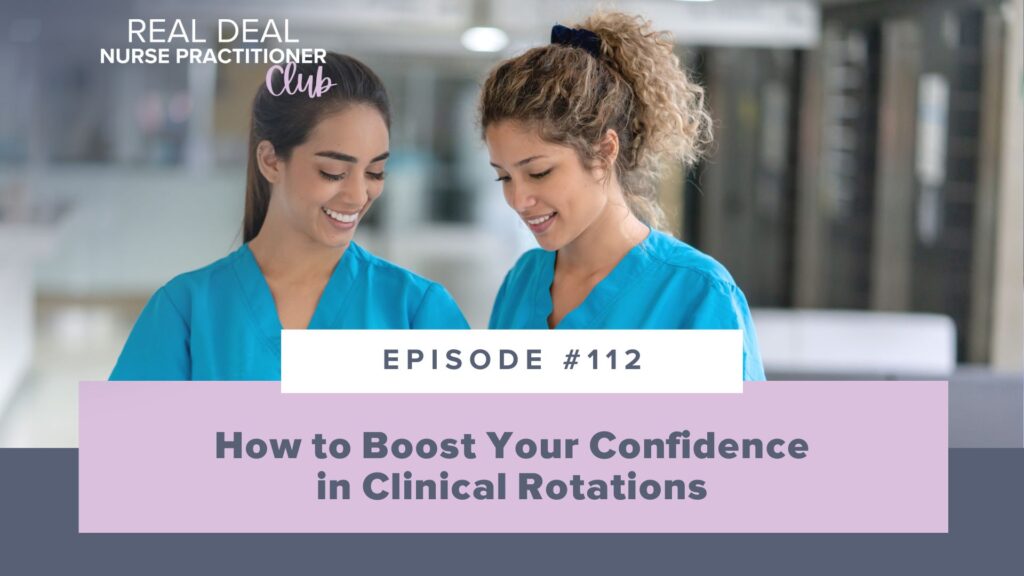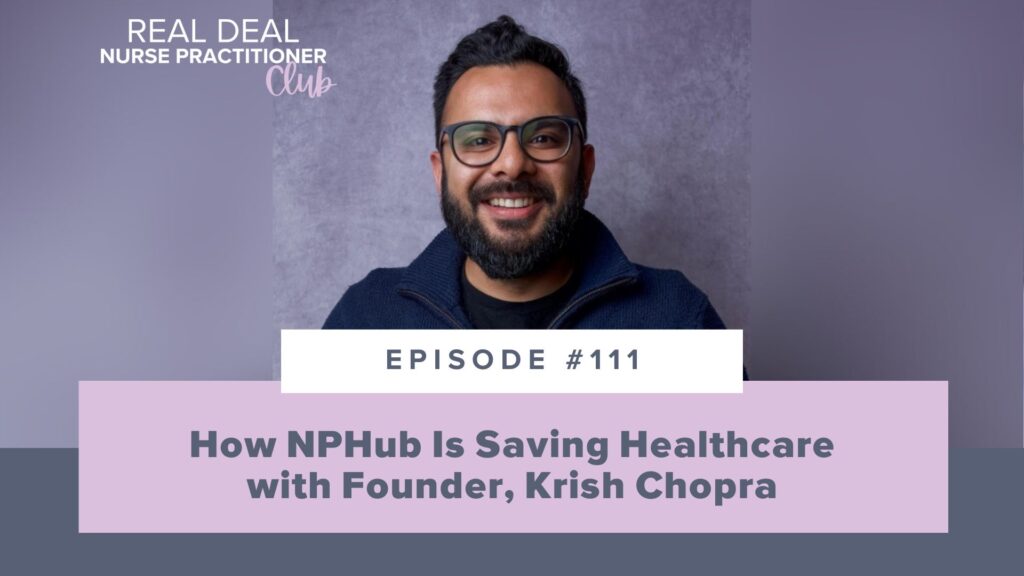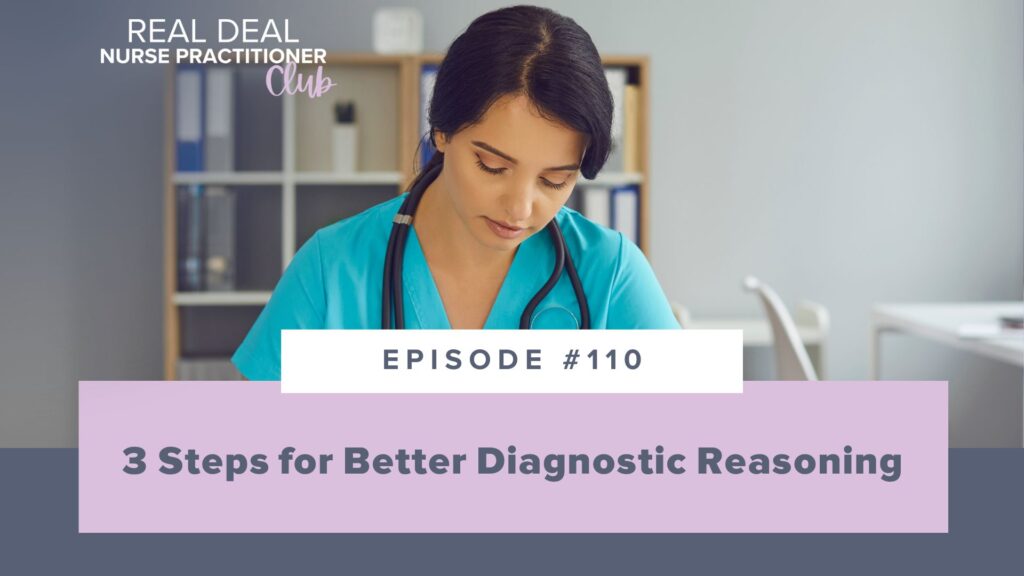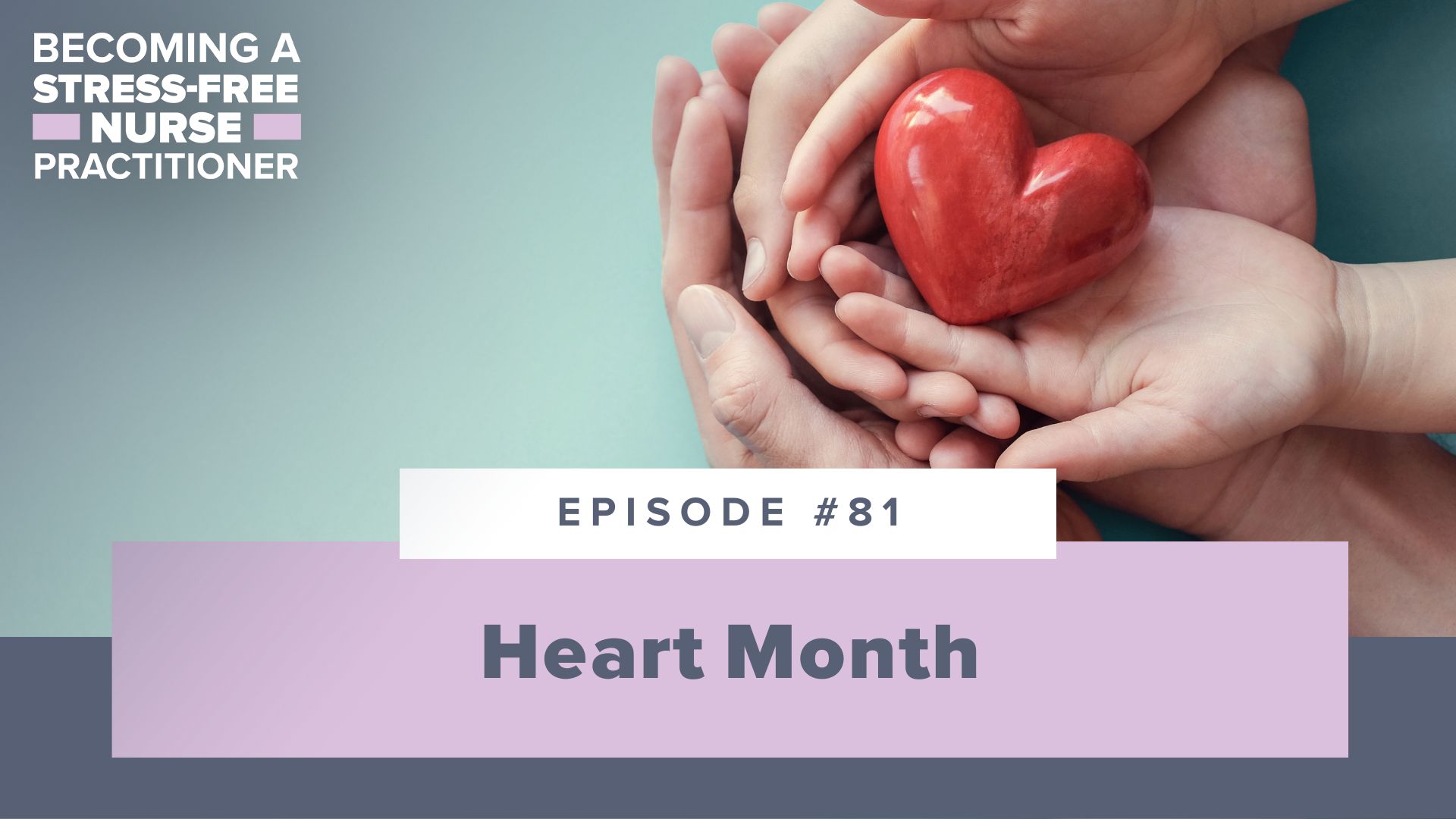
Friends, I am back from a very long break, and I’m about to tell you all about it in this episode. The last six months of my life have been a complete whirlwind, and I thought there’s no better time to come back than right now during Heart Month.
February is the month we celebrate and bring awareness to all the beautiful babies out there with congenital heart defects. My baby, Meadow, was born with a congenital heart defect called Tetralogy of Fallot, and I felt called to talk about not only Meadow’s story, but what it’s been like as a heart mom and a Nurse Practitioner.
The experience of a heart mama and Nurse Practitioner isn’t one I’ve seen much of out there, so I hope my insights offer support and hope if this is your experience too. I’m sharing how I’ve navigated these two roles, where I’ve found synergy in both, and where I’ve had to separate being Meadow’s mom and a Nurse Practitioner.
If you’re looking for support, no matter what phase of your nurse practitioner journey you’re currently in, I have communities available for both students and new nurse practitioners. In these communities, we work to uplift one another and grow this profession together every day, so click here to check them out!
What You Will Discover:
- Why I’m bringing awareness to Heart Month.
- How the last six months of my life have been the wildest to date.
- Three core principles that I believe are important about being a medical mom and a Nurse Practitioner.
- Why, the more questions you ask, the more respect you get.
- How I’m trying to embrace the medical mom role as much as I can.
Featured on the Show:
- If you’re looking for extra support, I have communities available for both students and new nurse practitioners. Click here if you’re a student, and click here if you’re a new NP!
Full Episode Transcript:
Welcome to Becoming a Stress-Free Nurse Practitioner, a show for new NPs and students that want to pass their board exam the first time and make that transition from RN to NP as seamless as possible. I’m your host Sarah Michelle. Now, let’s dive into today’s episode.
Hello, my friends. It is Sarah Michelle. I am back from a very long break that I’m about to tell you about. And it has been a whirlwind of the last three months. It is the longest gap I’ve ever had from sitting down to the microphone to do this podcast, even longer than my maternity leave.
But it’s been a wild ride, and I felt there was no better way to come back than to come back during heart month. Because, for those of you who don’t know, my baby, Meadow, was born in August, and she was born with a congenital heart defect called Tetralogy of Fallot.
So in February, we all celebrate and bring awareness to all the beautiful babies out there and all the beautiful kiddos that have congenital heart defects in hopes of raising more funding and being able to offer more to all of these kids out here that have the most common birth defect.
I would say the last six months of my life have been the wildest to date. So this podcast, you know, always I’m like, today’s podcast is going to be a little bit different because I want to share with you part of Meadow’s story and part of my story in my life.
And also, I’m doing this unscripted, which, for those of you who know me in any capacity know this is not how I roll. I like to sit. I like to plan. I like to script my podcasts. I like to roll. I like to sit here, and I’ve got everything contained, ready to go. And I’m not doing that today, so kind of bear with me.
This one’s a little bit more off-kilter. But I just felt really inspired to talk about Meadow and her journey and our journey. And not only that, but what it’s like and what it means to be a heart mom or a medical mom and also be a nurse practitioner because that is so tough. And it’s something that I haven’t heard talked about very much. And it is very much something that I’ve had to learn to navigate, and I’m navigating it every single day.
To give you a little background into Meadow, I was almost 34 weeks pregnant the first time we even had an inkling that anything was wrong with her heart. Me being the anxious person that I am, I didn’t like my OB. And I was like, yeah, I know it’s my third trimester, I know this is crazy, but I want to have a natural birth. And I don’t think my OB meets my anxiety needs or my birth preferences. And so, I’m going to switch OBs, and I’m going to find someone that will facilitate my having a natural birth if that’s what I choose to do.
So I did. And when I went to this new OB practice, they did another anatomy scan as a double-check. And on that anatomy scan, I remember getting a picture of Meadow’s hair and her foot. And I was looking at those with my husband, and we were talking to each other about how much hair she had. And we were just over the moon excited. We were ready to have this baby.
And my new OB comes into the room. And he’s like, “You know, the ultrasound tech thinks she saw a possible dilated aorta. That’s probably a normal variant. I don’t even really know what that means.” Like he couldn’t even tell me what that could signify. That was how little he had seen it in his practice. And so we’re just going to refer you to maternal-fetal medicine. And I’m going to go ahead and make your next appointment because I think you’re going to be back. Like, I’m literally not worried. I’m just referring you out to be extra cautious.
And so me and my husband really clung to being extra cautious, right? Like, no big deal. We’ll go see maternal-fetal medicine. Obviously, I’m anxious. I’m a little on edge. But he was like, “Meh, it’s probably nothing.” Well, a couple of weeks go by, it comes home for my next OB appointment, and maternal-fetal medicine still hasn’t called me. And I have called and called, and I can’t get an appointment.
And at this point, I’m pretty panicky because I’m 35, almost 36 weeks pregnant. And so the baby can come any day, right? I was like, “We’ve got to get this thing checked out. I’ve got to know what I’m dealing with if I’m dealing with anything.”
And so they did another ultrasound at that OB’s office, not maternal-fetal medicine. And her little dilated aorta looked worse. And I had a panic attack on the ultrasound table. And the lovely, beautiful human that was ultrasounding my big belly took my name off of all the pictures and sent them to her friend in maternal-fetal medicine because, unbeknownst to us, the ultrasound tech used to work at maternal-fetal medicine and had done half the training to do fetal echoes.
So she definitely knew something was up. She just couldn’t tell us what. And so she literally asked her friend, “What do you think this is?” And her friend couldn’t discern it either from the pictures, and they were able to get us an appointment at maternal-fetal medicine in two hours.
I will never be able to even remotely thank the ultrasound tech enough for going the extra mile for us. And no one will ever convince me otherwise that she didn’t save my baby’s life. So when we went to maternal-fetal medicine, I had two and a half hours’ worth of ultrasounds, which I did not wish on anybody. I was very sore.
And Meadow, being her stubborn self even then, would not let us get the final image that we needed to make the diagnosis. But we were able to narrow it down between transposition of the great arteries and Tetralogy of Fallot.
And I remember walking out of the office that day, and now I’m suddenly, unexpectedly a heart mom. So that in itself was kind of earth-shaking. But the doctor said to us as we were leaving, “You better hope it’s the Tetralogy of Fallot. That’s the one you want.”
And what a bizarre statement to even think about. You better hope for this heart defect. I’m like, can I hope for no heart defects? Like, can you all take all this back? But the next week we went back. We met with the prenatal cardiologist. We were finally able to discern it was Tetralogy of Fallot. And not only was it Tetralogy of Fallot, but it is also the most severe subtype of Tetralogy of Fallot with pulmonary atresia.
So essentially, the valve and the artery that takes blood from the right ventricle down through the lungs to get oxygen just did not exist in Meadow. So Meadow had all kinds of plans for her arrival on this earth. And ever since that day, I have had to navigate how do I handle being a nurse practitioner and how do I handle being a heart mom. And where do I find synergy between those two roles? And where do I have to separate those two roles?
And it has been really difficult. And it’s really not something that I feel like a lot of people have talked about. You know, I don’t see a lot of heart mama nurse practitioners. Maybe they’re out there, and I just haven’t found that Facebook group yet. But Meadow’s first surgery went so well I didn’t have to play my nurse practitioner card if that makes sense. We just kind of went with the flow.
And, obviously, when you’re fresh postpartum, and your brain is spinning off your body, and everything is just like chaos, all the hormones, all the recovery, all that sort of stuff, I couldn’t even step up to being the nurse practitioner role. But Meadow’s surgery, the first one, went really well. And we had all this gap time. And then, it came time for her second surgery.
So the first surgery was a patch. The second surgery was what they call her full repair. So they go in, and they truly like fix her defects. They get rid of the patch. And I’m in a support group for TOF mamas and actually TOF patient’s, too, which is a really cool group on Facebook. And so many of the people there say my baby had surgery on Monday and went home on Friday.
I won’t say that I anticipated that would be how Meadow’s surgery would go. I gave myself a little more flexibility. I said we’re going to be home in two weeks. I kept saying that. We’re going to be home in two weeks. It’s going to be fine. But Meadow had plans all of her own, per usual, and we were in the hospital for almost two months. And there was a two-week span of time where Meadow literally had six different surgeries.
So it was a lot, and it was the first time I had to step up to the plate to not only be Meadow’s mom but Meadow’s nurse practitioner in a way. And while I could have left the nurse practitioner role behind like I had in her first surgery, I definitely think that it better served all of us for me to try to step into that role when I could.
So I kind of boiled this down in my brain to three things about being a nurse practitioner and being a medical mom in general. So whether you’re a heart mom, or a NICU mom, or whatever sub-specialty of mama that you are, and also a nurse practitioner, I’ve kind of got to these three core principles that I think are important.
The first of which is always to feel free to advocate for your baby. There was a nurse that told me one of the very first days when Meadow was looking awful, awful, that I knew my baby best, so she was going to listen to me. And at first, I thought she was just like kind of rusing me a bit, like oh, you know your baby best, and then kind of fluffing me. But as the weeks went on, I kept thinking about that statement again and again and again.
And no one but me and my husband knows Meadow’s nuances. And all of these people, even her surgeons who are seeing her every day and the attendings who are seeing her every day, they’re only getting glimpses of who our Meadow is. And it was really important to remember that because we know her best, that should empower us to advocate, advocate, advocate always if we feel like something is awry.
If something isn’t right, we should feel free to step up. And not only step up as her parents, but me step up as a nurse practitioner with a knowledge base that I have to pose those really hard questions that not everybody wants to answer but need to be answered, right?
Not only should you feel free to advocate for your baby anytime, anywhere, always, but I do also think there is a realm of understanding. This is kind of my number two tip. For me, the cardiac ICU, the CICU, and all the things that have happened with Meadow’s congenital heart defect are completely out of my realm of educational knowledge. I’m not an acute care nurse practitioner. I am a primary care nurse practitioner for families.
So obviously, I have some peds basics, but this isn’t my specialty. Even if I was in acute care, I wouldn’t have all the knowledge. And so it was always okay to ask questions. There was a long time when I felt like I would look dumb, and people would discredit me if I asked questions. But that was never the case. And honestly, what I found is the more questions I asked, the more respect I got.
Now, I was never the person who, like, when someone walked in the room, I’d be like, “I’m a nurse practitioner.” But it always leaches through. It always goes through one way or another. And I remember sitting one day when Meadow – So the first days after Meadow’s surgery, she had her chest open, and she was 89 to 90 degrees. She was cold, and it was awful. And I wouldn’t wish it on anyone. And I felt like I was at my baby’s visitation in a lot of ways.
But the ICU doctor came in one afternoon when they were doing shift change, and he was talking about base excess. And so I started asking all these questions about base excess. And he looked at me, and he was like, “These are so intelligent and thoughtful. How in the world did you come up with these questions?” And I’m like, “Well, I’m a nurse practitioner.” So I was like, “I know just enough to be dangerous.”
And at the end of the day, that is the knowledge base I have, right? I know just enough to be dangerous. I know just enough to ask the right questions most of the time and try to get the right answers. But eventually, I had to let go of, “are they going to think I’m dumb?”
Because it doesn’t matter if they think I’m dumb, I have to know this answer so I can take the best care of Meadow as humanly possible. And as always, the goal at the end of the day, I’m going to take the best care of Meadow as humanly possible. And I’m going to make sure everyone that comes in this room also does the exact same thing.
And then the last thing that I think is the hardest for me, and maybe I feel a little shame or a little guilt when I try to do it, but I’m pushing myself to do it all the time, is you don’t have to be a medical mama and a nurse practitioner. You don’t have to play both roles. It’s cool if you can. There are a lot of really beautiful things that can come out of it. But you’re not always going to have the capacity.
So the first night after Meadow’s surgery, essentially what happened when she came out of surgery, they said it went pretty well, we’ll probably extubate tonight. And then, overnight, one of her chest tubes clotted off, and she ended up on cardiac tamponade. And because of that cardiac tamponade, they had to reopen her chest. That’s why her chest was opened the entire week.
There was no capacity or even ability that day or the next day, or even probably the day after that. It probably took me two or three good days to even be able to think as a nurse practitioner, to even be able to think critically. I was so lost and so overwhelmed, and literally, it felt like everything was coming down around me.
How could I possibly be a nurse practitioner and be a mom in that moment? I couldn’t. It just wasn’t in the cards. But as time went on and more decisions had to be made, and she got better, and she got worse, and she got better, and she got worse, I was able to pick that nurse practitioner card back up here and there. Bits and pieces, not all the time.
But I really have to push myself now that we’re out of the hospital to just be Meadow’s mom. And I love being Meadow’s mom. And I love to play with Meadow, and give Meadow baths, and pretend, well, not pretend but operate in a world where not everything is doom and gloom and knowing that there’s a light at the end of the tunnel for Meadow.
And yes, she will have future surgeries. But that is not today, and that will be to come. And they will hopefully not be as traumatic or big as the one she just had. But I really try to embrace that mama role because it’s the one I love the very most.
So, to sum up this episode, being a medical mama is tough, guys. It is really, really hard. Any of you out there that are doing it, I send you all my love and all of my kudos. And I almost tear up even at this thought of anyone else that has to become a medical mom or a heart mom because it is so hard.
But being a nurse practitioner gives you such a solid foundation for you to make the best decisions for your child and have that full picture. And so I will never not also be grateful that I was a nurse practitioner, and I am a nurse practitioner because I think in a lot of ways that has also saved Meadow’s life and that has changed Meadow’s life. And it has allowed us to care for her in the best way possible.
So before I get too weepy, I want to say happy heart month. I want to say I’m back. And I want to say that I love this podcast, and I’m excited to see how it can shift a little bit in the future. I’ve got some exciting plans, so let’s just see how these next few months shake out. You might be pleasantly surprised by what you find on this podcast.
As an extra bonus, friends, if you’re looking for support no matter what phase of your nurse practitioner journey you’re currently in, I have communities available for both students and new nurse practitioners. In these communities, we work to uplift one another and grow this profession together every single day. Links to join will be included for you in the show notes.
Thanks for listening to Becoming a Stress-Free Nurse Practitioner. If you want more information about the different types of support we offer to students and new NPs, visit https://www.npreviews.com/resources. See you next week.
Enjoy the Show?
- Don’t miss an episode: follow the podcast on Spotify, Apple Podcasts, Stitcher, or RSS.
- Leave a review in Apple Podcasts.
Search the Blog
Join our Facebook Group!
Get FREE support and encouragement from thousands of NP students and our NP Support team.
Learn More3 Study Hacks to Conquer Your NP Exam!
Download these tips that have helped thousands of students pass their NP board exams.
Download NowInstitutional Partnerships
Are you a faculty member and would like to bring Sarah Michelle’s resources to your school? Email us at nursinggroups@blueprintprep.com for special institutional pricing or click on the link below to learn more.
Learn MoreGroup Discounts
Are you a student and have 10 or more classmates interested in purchasing Sarah Michelle’s courses? Email us at nursinggroups@blueprintprep.com for special pricing.
